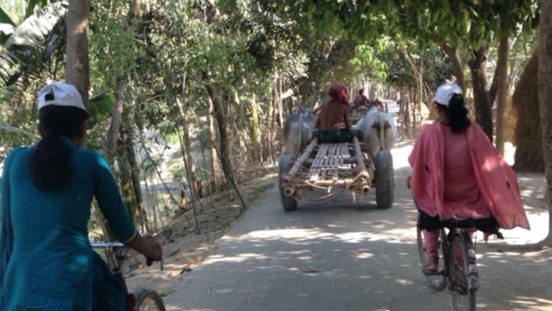I recently joined a COVID-19-themed Zoom session with 25 women entrepreneurs living in rural parts of Bangladesh who are trained to provide information- and technology-based services to village residents.
The session and the eSheBee program of which the women are a part are led by experienced social entrepreneur, Mosharrof Hossain, a native of Bangladesh. Over the past several weeks, these women have participated in eLearning courses via their smart phones in order to become COVID-19 first responders. Their role will be to generate awareness about health practices and disseminate the government’s advice about mitigating the spread of COVID-19 virus. They will counter social-media misinformation that advocates treatments such as shaving one’s head and rubbing saline in one’s nose to protect against COVID-19.
The crisis they will respond to is not just – and not even primarily – a public-health crisis, but also a humanitarian one.
When the nation-wide lockdown in Bangladesh began on 26 March 2020, people were advised to remain off the streets. The concepts of sheltering in place and social distancing in Bangladesh, however, are tricky ones to put into practice.
Rural families often consist of a dozen members living together in a single dwelling and who span 3-4 generations. Families live each day on the income (or products) that their members have earned that day. Their loss of mobility means the loss of income, which means the inability to purchase food. According to recent reports, 14% of families now have no food at home, and over 70% have lost their source of livelihood. This situation is less a public-health crisis, Asif Saleh, Executive Director of BRAC tells us, than “a humanitarian crisis with a public health dimension.”
Alongside relief efforts promised by the government’s Disaster Management and Relief Ministry and coming from large-scale NGOs such as BRAC, Bangladesh’s female entrepreneurs from programs such as eSheBee are also being mobilized.
These young women are trained to provide digital-technology-based services to marginalised villagers. Until the recent shutdown, most of their work covered a vast territory. In different villages during the course of a day, rural entrepreneurs measured blood pressure, checked blood-glucose levels, and provided pregnancy tests. They topped up mobile-phone airtime, arranged digital remittances, and helped migrant workers abroad to skype with their relatives in Bangladesh. They also helped people to access government poverty-alleviation schemes. Now, in addition to key health-related information, these women will deliver medicine, essential goods, and vital information to vulnerable families so people can remain safely at home.
In 2013-14, I conducted ethnographic research among women entrepreneurs in rural areas in northwestern Bangladesh. My book, To Be an Entrepreneur, documents their trials and tribulations as they attempted to mobilize their social lives and social contacts in new and entreprenruial ways, while also harnessing market opportunities to support their families and extended kinship groups. These brave women struggled against social expectations that women should stay at home, faced stigma as they rode bicycles from village to village, and experienced anxiety when they could not convince fellow villagers to pay for the services they provided.
But these women also built a strong community of fellow entrepreneurs who faced similar challenges, experienced the pride of earning their own incomes for the first time, and began to dream of futures where their families could rely on them as much as they relied on their families.
While I attended the COVID-19 eLearning session for eSheBee women entrepreneurs, I witnessed good practice in online education (a skill with which all educators across the world are also experimenting). I saw the women’s dedication to continuing to contribute to the health and wellness of their communities, even at a time when their livelihoods and opportunities for earning were temporarily closing down due to the mandates of the pandemic.
Crises such as these (and Bangladesh is certainly no stranger to them) often open windows for new kinds of actors to gain social recognition, and I hope that Bangladesh’s rural women entrepreneurs are recognized for the care, service, and valor they will be contributing in the coming weeks and months.
This is a repost from Cornell University Press Authors’ blog.
Juli Qermezi Huang is an assistant professor in Anthropology and International Development at the University of Edinburgh in Scotland, UK. She received her PhD in Anthropology from the London School of Economics.










Comments by